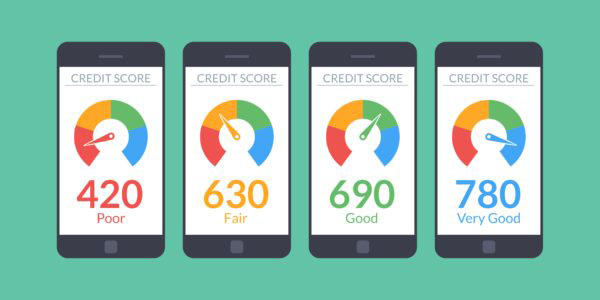Your credit report is the foundation of your financial health. And, having a poor credit score can limit your ability to get a credit card, a loan, or even a job. So, if your credit score starts to suffer, you’ll need to take steps to repair it as soon as you can. However, recognize that fixing a damaged credit score is a long process that’s not necessarily easy, and any company that tells you it can fix your credit overnight is not telling you the truth. It’s actually likely to damage your credit further by trying to employ quick-fix tactics.
The most effective way to build your credit back up is to be responsible with it as time goes by. If you haven’t been responsible with your credit in the past, then you’ll need to try to repair the history in order to see an improvement. First, you’ll need to understand what makes up your credit score and how certain activities and instances will affect it.
How is my credit score calculated?
The most important factor affecting your credit score is your payment history, representing 35% of the calculation. This is the most important thing to potential lenders because the belief is that past payment history is a good predictor of future payment habits. While a few late payments won’t cause great damage to your credit score, it’s best to try to make payments on time, always. However, never missing a payment won’t result in a perfect score. Payment history, while very important, is only a piece of the puzzle when it comes to calculating your credit score.
The second most important component in calculating your credit score is how much you owe your lenders, comprising about 30% of your score. While owing money doesn’t necessarily classify you as a high-risk borrower, the amount of available credit you’re using can. When that percentage is high, lenders feel like you might be overextended and could be at risk of missing payments in the future.
A third factor in calculating your credit score is the length of your credit history. As a rule, the longer you’ve had credit accounts, the better your score should be. Length of credit history makes up about 15% of your FICO score.
The next two components, both weighing in at 10%, are the credit mix and any new credit you’ve applied for or obtained recently. Your credit mix considers the types of credit accounts you have, such as credit cards, installment loans, and mortgage loans. Having accounts of all types isn’t necessarily important, and you shouldn’t open up accounts that you don’t need to try to improve your mix. Your mix of accounts, and how it affects your credit score, is dependent upon your total credit picture. The last component looks at any new credit you may have applied for or obtained. Opening several accounts in a short period can be detrimental to your credit score, particularly if your credit history is short.
What should I do if I have a poor credit score?
You can take several steps when you discover your credit score is suffering. Look at these five steps to help you get on the path to restoring your credit score.
1. Pull your credit report
The first thing you should do if you discover that your credit score is suffering is to obtain a copy of your credit report. You’re entitled to one free report each year from each of the three credit reporting agencies. You can request your reports by visiting annualcreditreport.com, by calling 1-877-322-8228, or by filling out the Annual Credit Report Request Form and mailing it to the following address:
Annual Credit Report Request Service
P.O. Box 105281
Atlanta, GA 30348-5281
When making your request for your free copies, you’ll need to provide pertinent information such as your social security number, date of birth, and name and address. You may have to provide some other personal details as a security measure, such as the amount of your car or mortgage payment. You’re also entitled to a free credit report if turned down for credit or insurance or denied employment due to credit reasons in the last 60 days. You may also get a free report if you’ve been the victim of identity fraud, are on welfare, or unemployed and looking for a job.
If needed, you can buy a copy of your report by contacting the individual agencies at the numbers below.
Experian 1-888-397-3742
TransUnion 1-800-916-8800
www.transunion.com
Equifax 1-800-685-1111
www.equifax.com
Once you receive your credit reports, review them carefully for errors, particularly late payment errors. Also, check to make sure that the amounts owed on each of your accounts is correct. Keep in mind that if you pay off your credit cards each month, your report will likely show a balance anyway. That’s because most credit reporting agencies will pick up your latest balance on the account. Errors include accounts that don’t belong to you, accounts that have been closed by you but show closed by the lender, late payments that are older than seven years, errors in your personal details such as your name, address, or employer information, or items such as paid collections, tax liens, or other accounts that still show unpaid.
2. Dispute any errors
It’s required that you notify the reporting agencies in writing of errors you find on your credit reports. Along with your notification, supply any backup documentation you have, and any important details of your dispute. Make sure your personal information is included and correct, that you are clear and concise in explaining any errors, and that you request removal or correction.
Use certified mail to make sure your information gets to its destination, and be sure to keep your document file in a secure place so you’ll have it for follow-up. If easier, you can contact the person or company that supplied the incorrect info to the credit agency. In many cases, you’ll be able to resolve the problem much faster and it’ll create a notification on your credit report that you’ve disputed the negative information. The provider is responsible for contacting the credit agency if the dispute is resolved.
Once you’ve notified the agencies of the error and submitted your supporting information, the agency is required to investigate within a short period, usually about a month. The agency will send notification of the dispute to the creditor reporting the error and require that it respond in a short period. If an error is confirmed, the creditor must notify all three credit-reporting agencies. The agencies must then send a notification of correction to any party that has requested your credit report for six months prior and employers who’ve requested your credit in the previous two years.
If you’re unable to get what you feel is a legitimate error off your credit report, you can submit a statement telling your side of the story that would be required to be included with your credit reports in the future. For a fee, you can have this information sent to anyone who’s recently requested your credit information.
If at any time in the process you feel that you’ve received unfair treatment, you can file a complaint with the consumer affairs department in your state or with the Consumer Financial Protection Bureau. In most cases, you can do this online.
3. Mind your payment history
Your actions of today will determine your history tomorrow. In other words, you’re building your payment history every day. The best way to establish a good payment history is to make your payments on time. This is because late payments, even if they’re only late by a few days, can have a detrimental effect on your credit score. Since payment history makes up 35% of your credit score, you must do everything you can to ensure your payments arrive on time. Late payments are not fixable on your credit report; they’ll often stay there for seven long years.
One way to keep from missing payments is to set up automatic payments or at the very least payment reminders. Many banks offer this service via email or text. You can also have your lenders do auto-pay deductions from your accounts on a monthly basis.
If you’ve missed payments, you need to get current as soon as possible and stay that way. Once you’re current, every month you make your payments on time will help improve your credit score. The older the late payments are, the less impact they’ll have. It’s important that you remember, though, that a paid collection doesn’t automatically come off your report. If you’re truly struggling, consider contacting your creditors to see what you can arrange, or seek out the advice of a credit counselor.
4. Reduce your debt
Knocking down your balances will not only help your credit score, it will also improve your financial picture substantially. In order to get a handle on your debt, you must first stop borrowing money. Make sure you know what your balances are and what interest rate you’re paying so you can formulate a plan to pay it off.
You can consider a debt consolidation loan that’ll combine your debts into one loan that has a lower interest rate than what you currently pay on your credit cards or other high-interest debt. Or, you can transfer balances from high-interest credit cards to zero interest cards to help pay them down faster. Better yet, develop a plan that pays off your debt either by paying off the smallest balance first and snowballing your payments until all your debt is paid off or by paying off high-interest cards first while maintaining minimum payments on all the rest.
However you choose to pay off your debt, do it in the quickest way possible. Few things can improve your financial picture faster than getting rid of debt.
5. If you need new credit, acquire it wisely
When you apply for new credit, the credit-reporting agencies receive notification, which factors into your credit score. The age of your accounts, meaning how long you’ve had them, is also a component that’s considered. Your age of accounts is an average of all your accounts, so new accounts will lower your average account age. Therefore, it’s not wise to open accounts that you don’t need.
If you’re shopping for a loan, do it within a relatively short period. This way, it’ll be recognized that you’re not seeking multiple loans but rather shopping for the best rate on a single loan. Also, requesting your own credit report doesn’t affect your score if done by contacting the credit-reporting agencies or other organizations authorized to provide them to you.
Although the mix of accounts can factor into your credit score, don’t try to game the system by opening accounts you don’t need just to try to get the right mix of account types. Chances are strong that this will backfire and actually damage your credit score.
In conclusion, there’s no quick fix for a poor or damaged credit score. You won’t see an immediate rise in your credit score by following these practices, but you’ll see a slow improvement over time. The very best thing you can do for yourself is to manage your financial life responsibly by paying your bills on time and keeping your debt load in check. Restoring your credit score will not be fast or easy; it’ll require being patient and practicing discipline.





